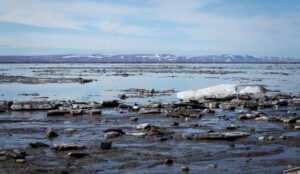Our Team
Katrina Lewandowski
Coastal Resilience Specialist & Knauss Marine Policy Fellow

Katrina is a 2024 John A. Knauss Marine Policy Fellow working as a Coastal Resilience Specialist in the National Sea Grant Office.
She is also a Ph.D. candidate at Wayne State University and is currently working on her dissertation in Great Lakes ecology studying the interactions between non-native quagga mussels and yellow perch. Upon completion of her degree, Katrina will hold a dual title in Biology and Urban Sustainability.
While in graduate school, she collaborated with a local non-profit to install green stormwater infrastructure and has a passion for community outreach and engagement and climate adaptation. She also served as a student member on the Board of Trustees for the Michigan chapter of the Nature Conservancy. During her two years volunteering with the Nature Conservancy, Katrina advised on project direction at board meetings, met with lawmakers to communicate relevant conservation bills and contributed to multi-agency projects identifying key conservation features within Michigan.
In her time outside work Katrina enjoys beach combing, ballet, and learning new hobbies.
Email: katrina.lewandowski@noaa.gov
Learn More About Our Work


How NOAA Sea Grant is investing $4.25 million to further a resilient future
Sea Grant’s work in coastal adaptation and resilience includes research, education, technical assistance and outreach to support more resilient communities and economies across the nation. Amid extreme and frequent weather


Expanding and Connecting Tribal-Led Climate Change Capacity To Serve Indigenous Community Needs In Alaska
As winter ice melts along the Alaska shoreline, revealing mud and water, snowmelt floods threaten property and lives. The rising waters from thawing snow can overwhelm rivers, streams and drainage


Sea Grant announces new projects to address community needs regarding contaminants of emerging concern
Gavin Dehnert, an Emerging Contaminants Scientist at Wisconsin Sea Grant, investigates the impact of emerging contaminants on aquatic ecosystems. (Photo Credit: Wisconsin Sea Grant.) Coastal and estuarine waters are important